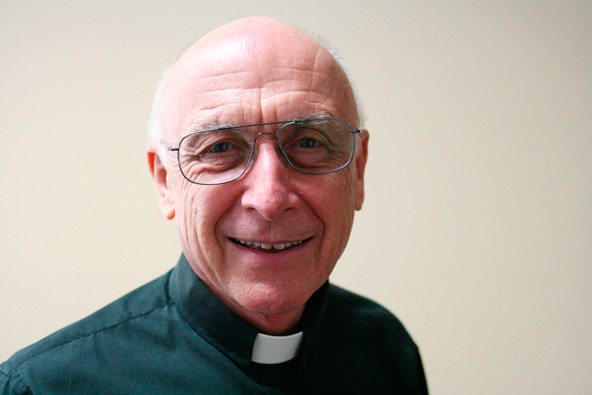
Mill Hill Missionary Father Gregory Rice is perfectly matched for his new role as director of Native American Ministry for the Phoenix Diocese.
He has spent more than three decades catechizing, teaching, ministering and leading people closer to Christ in an environment similar to the Arizona deserts.
The heat in Pakistan can eclipse even the hottest summer days in the Valley, but it’s less about the weather index and more about the priest known in some Native American communities as, “Fr. Pakistani.”
In addition to his appointment as director, Fr. Rice was also named canonical pastor of St. Peter Parish in Bapchule and St. John the Baptist Parish in Laveen, and their respective 11 mission churches.
The missions, spread far and wide from the Salt River Indian Reservation to Gila Bend, are already familiar with Fr. Rice. For nearly five years he has been helping his predecessor, Franciscan Father Dale Jamison.
“I loved my work. I tried hard to make the missions look like parishes in Phoenix by doing repairs and adding additions, and I enjoyed bringing the Eucharist to the communities,” Fr. Jamison said. “Fr. Gregory has the spirit and energy to continue the work, and I think he will make a fine replacement.”
For Fr. Rice, it’s really about the human experience. He is relocating his office to the St. Francis of Assisi Mission on the Salt River Pima-Maricopa Indian Community in an effort to be more present to the people he serves.
By virtue of his baptism at Holy Family Parish in Denver, Fr. Rice has always been serving others, including a stint in intelligence with the United States Air Force.
And this is where the story begins.
During his 15-month assignment in Pakistan in 1963, Fr. Rice met Bishop Nicholas Hettinga, MHM, of the Diocese of Rawalpindi, Pakistan.
The bishop hosted a few of the airmen, taking several days to give them a tour of local hospitals, schools and a new monastery.
It had an impact on Fr. Rice, and he eventually found himself volunteering at an orphanage.
By the time Fr. Rice was 24, he was approached by Msgr. Joseph Pollack, a chaplain.
“He said, ‘Why don’t you become a priest?’ I laughed in his face,” Fr. Rice said. “They were always on the lookout for guys in the service who might have a vocation.”
And they found one in Fr. Rice. He applied to the Mill Hill Missionaries, an international English-speaking missionary founded in Mill Hill, London.
Following his discharge from the Air Force in 1965, Fr. Rice entered the order, studying philosophy in St. Louis and theology at St. Joseph College in London.
Bishop Hettinga ordained Fr. Rice in his Denver home parish on June 25, 1972. His first mission was to Pakistan, where he served from 1972-2006.
For the first 17 years, Fr. Rice had a parish, and duties in administration to go along with it. The latter years were spent running a program for heroin addicts.
Fr. Rice delved into the culture, language and people of Pakistan, absorbing their rich traditions, and working with the Holy Spirit to eliminate the evil.
The program he worked with, Caritas Pakistan, had a reputation of compassion among drug users. Knowing their lifestyle and habits helped Fr. Rice make huge inroads in their treatment.
“I could walk up to a group of guys on the street half out of their minds from smoking heroin and squat down and talk with them,” he said. “We were out on the streets every single day when we knew they were doing their evening hit. I could go alone, or with staff, and there was never any danger in that.”
Fr. Rice hopes to establish that same kind of trust and camaraderie with the Native Americans in Arizona he is now assigned to serve.
“I see similarities with both these communities. There is a genuine simplicity and humility among the people that is very refreshing and very holy,” Fr. Rice said. “There are substance abuse problems among the Native Americans, and it is an issue on the reservations, and it certainly existed in Pakistan.”
Fr. Rice would like to recruit other priests to volunteer to help with Masses so he doesn’t have to rush from one mission to the next, which could be up to 50 miles away.
“I don’t have that feeling for the culture I’m serving now because I have not had enough on-the-ground contact,” Fr. Rice said. “We are spread so thin with so many demands. It’s one of the deficiencies I hope, in time, we can address.”
What he does sense is tremendous gladness.
“It’s important that one lives a sense of joy — joy in service and projecting a sense of joy in what it means to be a follower of Jesus Christ,” Fr. Rice said. “I’m looking forward to getting to know the people.”





